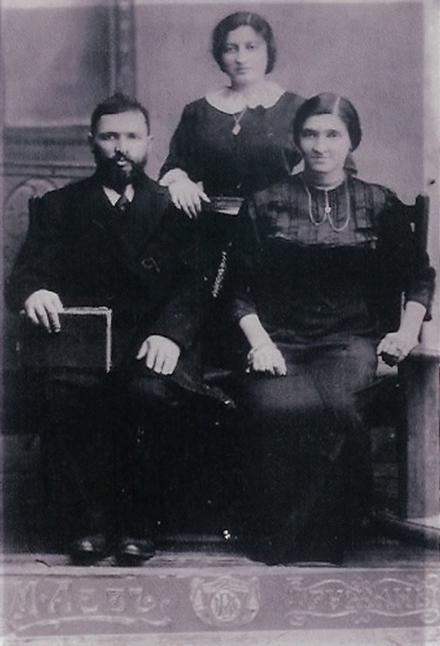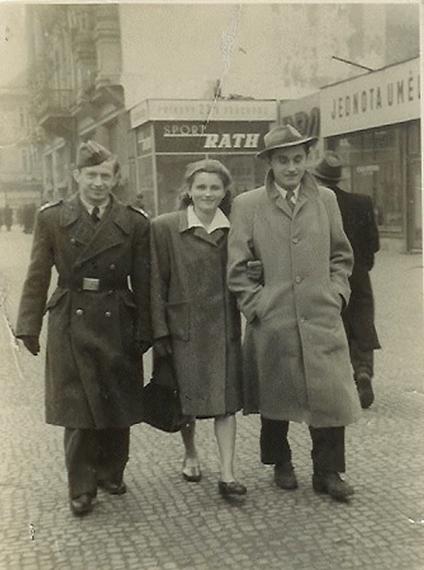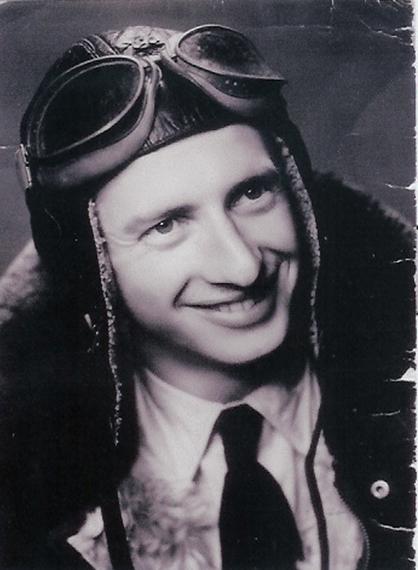Avraham Harshalom (orig. Adam Fridberg) was born in 1925 in the village of Pruzhany (Prużana), Poland (today Belarus) to Cyra and Moshe Fridberg.
His mother was active in charitable and communal organizations and was an ardent Zionist. At home they spoke Yiddish, but she enrolled Avraham and his brother Sioma at the "Yavneh" Hebrew school and the "Tarbut" high school.
In September 1939, Pruzhany was occupied by the Soviets, and in June 1941 the Germans invaded. The Pruzhany ghetto was established in August 1941 and the deportations to Auschwitz began in January 1943. "During the selection, when they asked me how old I was, I said that I was born in 1924 – a year older than I really was. I thought it would be better to say that I was no longer a youth." Sioma, Avraham's brother, was murdered in the gas chambers about a month and a half after their arrival at Auschwitz.
In June 1944 Avraham, together with two others, planned to escape from Auschwitz. "On the day that we intended to escape we exchanged our prison uniforms for civilian clothes and drank alcohol, both for courage and to bolster our cover-story as drunks, should we be caught. Whilst we were preparing our escape I met on my way an old friend from my town. I whispered "If you hear an alarm tonight, you will know that I have escaped."
"In the afternoon we slipped away from the camp. We hid inside a pit and a friend covered us with tin, spread dust over the top and scattered tobacco so that the SS search dogs would not sniff us out. We heard sirens announcing to the camp that they were searching for missing people. We heard dogs barking above us. We held our breath and didn't even dare to bat an eyelid in case they heard. Our situation was unbearable, the pit was small and the air holes had apparently been closed up; we couldn't stay there."
They succeeded in escaping from the camp, but Avraham and one of his friends were recaptured after a few days. "We were given 25 lashes with a formidable leather whip on our bare buttocks. After that beating I couldn't sit for weeks." Avraham was marked as a criminal with a red, circular patch.
In October 1944, around 10,000 prisoners were evacuated from Auschwitz. "After they had removed so many people, we, the penal group, managed to mingle together with the other prisoners. We removed the red patches from our prison clothes and acquired the same status as the regular prisoners." Avraham was sent to the camps of Oranienburg, Sachsenhausen, and Ohrdruf-Crawinkel, a sub-camp of Buchenwald. Finally, after a number of months and with the approach of the Western front he was returned to Buchenwald on foot. "Anyone who lagged behind was shot dead at the side of the road. We walked for several days. At night we slept out in the open."
In Buchenwald Avraham passed himself off as a Pole and was sent by train to Leitmeritz. "After a few weeks in Leitmeritz I approached two of my friends and suggested to them that we should try to join the next group to be transferred to another camp in central Germany and then attempt an escape en route.
"At one of the stations, when our train stopped next to a coal-train, we exchanged glances. We all had the same thought: This is it! All together, we leapt from our places, crossed over to the coal-train and lay flat on the piles of coal. The Germans didn't notice us. The coal train arrived at Holešovice station in Prague where the coal storehouses were situated. We stood in our prison clothes between the piles of coal, behind one of the station buildings and we didn't know what to do. Suddenly, we saw a teenage boy and girl who looked like high school students. We took our life in our hands, came out from our hiding places and stopped them. We communicated with the boy using a mixture of sign language and words in Russian and Polish. We made it clear that we needed clothing. The boy looked at his watch and said: "Poczekaj". In Polish "czekaj" means to wait. We understood that he was telling us to wait for him.”
The youth - Indra Sobotka - brought Avraham and his friends clothes and took them to his mother's home, where they hid. Afterwards, the escapees were moved to a hiding place in the warehouse of an artificial-flower shop. Indra’s mother, Irina Sobotkova was later recognized by Yad Vashem as "Righteous Among the Nations".
In April 1945 Avraham was hurriedly trained in the use of weaponry and helped fight against the Germans who were retreating from Prague. On 8 May, Prague was liberated by the Red Army. Avraham received Czechoslovakian citizenship as well as awards and certificates confirming his involvement in the liberation of Prague.
With the outbreak of the Israeli War of Independence, representatives of the Haganah in Czechoslovakia enrolled Avraham in a pilot's course with the Czechoslovakian Air Force so that he could help in the war for the newly founded State of Israel.
In March 1949 Avraham arrived in Israel and served in the Israeli Air Force for the duration of the War of Independence. In 1951 he founded a company called "Ariel", named after an Air Force base in Jaffa, which, in time, became a successful group of companies active both in Israel and abroad.
In 1951 Avraham got married; the wedding ceremony was conducted by the Chief Rabbi of the Air Force. Avraham has a daughter – Tzeira, two sons – Moshe and Aharon and grandchildren.
"My obligation to my children and to their generation is to tell the story of the Holocaust as I experienced it so that they will know how to value the independence, freedom and strength with which they live," wrote Avraham in the introduction to his book "Alive From The Ashes" which has been translated into many languages included English, German and Czech.



